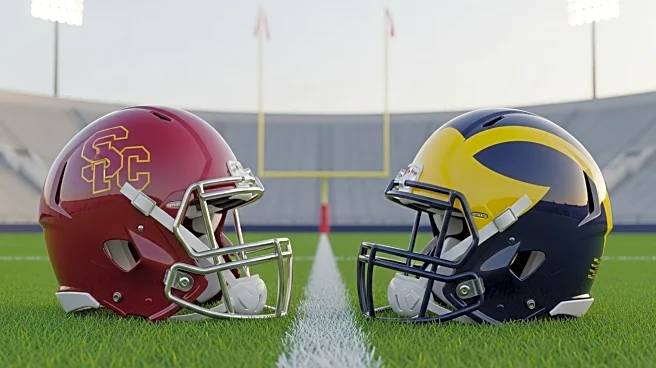What is the story about?
What's Happening?
The USC Trojans football team is preparing for a significant matchup against the Michigan Wolverines this weekend. Both teams have already suffered one loss this season, making this game crucial for their standings. The Trojans, known for their strong passing game led by quarterback Jayden Maiava, are facing challenges with their defense, particularly in run defense. In their last game against Illinois, USC allowed nearly 200 rushing yards, which contributed to their 34-32 loss. Michigan, on the other hand, is expected to leverage their powerful rushing attack, aiming to exceed 300 rushing yards against USC. This game is part of the expanded Big Ten schedule, which now includes teams from the Pac-12, creating exciting matchups like this one.
Why It's Important?
This matchup is pivotal for both USC and Michigan as they aim to maintain their positions in the College Football Playoff contention. A win for USC would bolster their chances, especially with upcoming games against top teams like Notre Dame and Oregon. For Michigan, a victory would reinforce their standing and showcase their ability to dominate in the trenches, particularly against a team with a questionable run defense. The outcome of this game could significantly impact the coaching reputation of USC's Lincoln Riley, as a loss might raise questions about his program management. Additionally, Michigan's Justice Haynes is looking to solidify his Heisman candidacy with a strong performance.
What's Next?
Following this game, USC will face other challenging opponents, including Notre Dame and Oregon, which will further test their capabilities and playoff aspirations. Michigan will continue to build on their momentum, aiming to capitalize on their rushing strengths in future matchups. The results of this game could influence the strategies and adjustments both teams make in their subsequent games, particularly in addressing defensive weaknesses and optimizing offensive plays.
Beyond the Headlines
The expanded Big Ten schedule, including teams from the Pac-12, is reshaping college football dynamics, offering new rivalries and competitive matchups. This integration is not only enhancing the level of play but also increasing the stakes for teams like USC and Michigan, who must adapt to new opponents and strategies. The cultural and strategic shifts resulting from this expansion could have long-term implications for college football, influencing recruitment, fan engagement, and media coverage.















